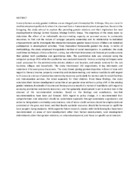| dc.description.abstract | In every human society, gender relations are an integral part of everyday life. In Kenya,
they are crucial in rural development particularly when it is observed from a human
development perspective. Based on the foregoing, the study set out to explore the
prevailing gender relations and their implication for rural development in Mwingi Central
Division, Mwingi District, Kenya. The objectives of the study were: to determine the
effect of an individual’s decision-making capacity on personal access to community
resources; to find out the nature of conjugal property ownership and its relationship to
individual empowerment; and to investigate the interaction between gender-based
division of labor and individual participation in development activities. Three theoretical
frameworks guided the study. | en_US |
